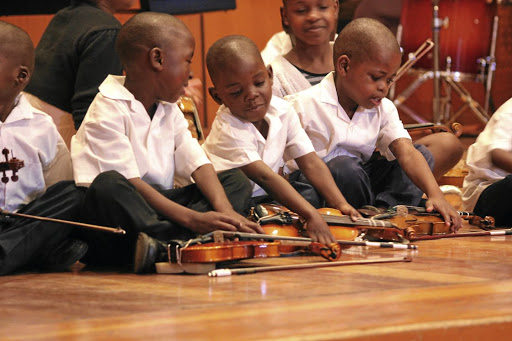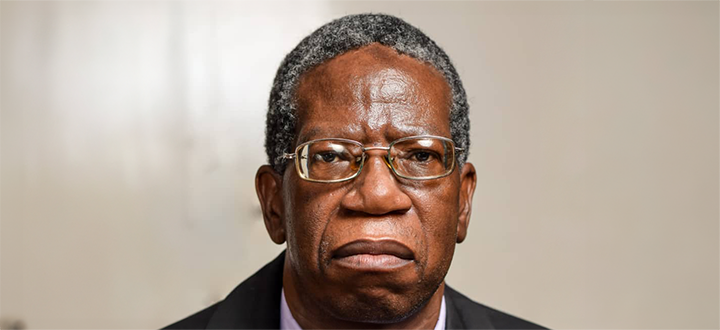Leading change
Youth education and empowerment through music
The ability of music to raise spirits and inspire is something that most people innately understand.
The discipline of actually learning to play an instrument is altogether harder, but the pleasure of creating combined with the process of learning are helping township children to find a new path in life.
The Unisa Music Foundation is giving about 1 400 students from disadvantaged backgrounds access to musical instruments, free lessons, the chance to earn recognised qualifications and to perform in orchestras and ensembles.

Image source: www.businesslive.co.za
The result of the outreach programme is that teenagers are being lured away from gangs and drugs and children being raised in orphanages could achieve a brighter future.
“Our goal is to empower disadvantaged kids across the country through music,” says Professor Karéndra Devroop, Unisa’s acting director for music. “Research is very clear that music has a positive impact on kids and it’s twofold: socially it impacts their lives because it’s a happy environment and it’s psychologically valuable with a sense of happiness, optimism and perseverance.”
Devroop took over the 15-year-old project six years ago and implemented a rapid expansion plan after seeing similar projects working well in the US, where he studied as a Fulbright scholar.
“It’s grown to cater for about 1 400 severely disadvantaged kids who come from orphanages, low-income single-parent kids or kids involved with gangs or drugs.”
Unisa has built a training centre in the heart of Soshanguve for this outreach programme. It also rents premises in Soweto, Mamelodi, Hammanskraal and Atteridgeville where children can attend music classes two or three times a week.
“Ideally we’d like to have centres where they can work every day from 2pm to 5pm, which is the time when they are on the streets and most vulnerable after school, but there’s only so much that Unisa can afford,” Devroop says.
The Unisa teachers also go to two HIV/AIDS orphanages in Atteridgeville several times a week, where children as young as two years old join group music classes.
As the youngsters become more skillful they can join performing groups including the Unisa Music Foundation Symphony Orchestra, the Youth Orchestra, the Wind Ensemble and the Unisa Jazz Big Band.
The success stories have surpassed all expectations, with some of the children going on to play with the best orchestras in the country and performing with leading international orchestras when they visit SA.
Several years ago a homeless boy, Tshepo Ndlovu, turned up and began learning the classical guitar. He eventually gained Unisa Level 8 qualifications in the guitar, flute and saxophone and took three years to complete his matric.
He went to university, earned a degree in music and is now enrolling with Unisa for an honours degree.
“He has become one of our best teachers and he’s a role model for our kids. They look up to him and realise that through music they can find a pathway to be successful in life and take themselves out of poverty,” Devroop says.
Septimus Mazwi is a former prisoner who studied music through Unisa’s presence in jails. “He came through the prison system, got his qualifications and became one of our top teachers in Soweto,” says Devroop. “He counsels the kids on all the reasons why you don’t want to go to jail, so he’s teaching them life lessons.”
The musical outreach programme is staffed by about 50 black teachers. Their skills are being improved as Unisa invests in their training and pays for them to study with top musicians. They all hold Unisa Grade 8 qualifications and some are earning bachelors and masters degrees in music.
“The biggest challenge is that we are based in the townships and our regular white teachers won’t go into the townships,” Devroop says. “There have been some incidents where they were held up at gunpoint.
“We struggle to get qualified black music teachers so we grow our own.”
Learning to play an instrument has a broader effect on the children’s characters than only turning them into crack musicians.
“When you play in an ensemble there are certain characteristics that come into play, like leadership and teamwork, and we hope that will transfer into other areas of their lives,” says Devroop.
“There’s lots of research about music making you smarter and we see the benefits — we see our kids finishing matric and going to university and we try to assist. If there are fields they want to study at Unisa we will definitely offer them scholarships.”
The music outreach programme is so life-changing that it is now being expanded to create more job opportunities for the children, which is vital because there are limited positions for young musicians.
Those without the skill to be top-class performers can branch out and learn to become music teachers or instrument repair technicians — two of the students are training overseas for a year with a manufacturer to become technicians specialising in repairing wind and brass instruments.
There is an global shortage of top-class Steinway piano tuners and one student is enrolling at the Oberlin Conservatory in Ohio on a full scholarship to be Africa’s first black Steinway technician.
“A number of kids just don’t have the skill to be high-level professional musicians,” Devroop says. “To become a musician there are certain things you have to do. You have to be patient. You have to practice daily so there’s a consistency of sitting by yourself for an hour or two a day working painstakingly to get over the challenges.
“These skills transfer very well to any profession. Imagine someone becoming an engineer or a medical professional where what’s required is persistence, perseverance and aiming at professionalism all the time. We try to instill these values in the kids,” he says.
No matter what the students go on to study, Unisa asks two things of all the youngsters who go through its community music programme.
First is that they give back to their community through their skills, because somebody gave to them. The second is that they never stop playing their instrument and that they sometimes come and play with its ensembles so younger children can look up to them as role models.
*By Lesley Stones | 2017-07-20 06:07
This article first appeared in the Business Day and is used by permission. You can read the original article here.
Publish date: 2017-08-07 00:00:00.0


 Mental health among men in the workplace needs more attention
Mental health among men in the workplace needs more attention
 "I owe everything to Unisa and my late supervisor's priceless mentoring"
"I owe everything to Unisa and my late supervisor's priceless mentoring"
 Majikijela - a queer scholar raising homosexuality awareness through his work
Majikijela - a queer scholar raising homosexuality awareness through his work
 Unisa and Inqaba Biotec unveil groundbreaking DNA research platform
Unisa and Inqaba Biotec unveil groundbreaking DNA research platform
 College of Law appoints esteemed scholar as executive dean
College of Law appoints esteemed scholar as executive dean